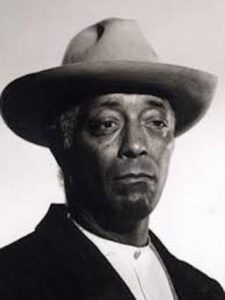
Juano Hernández
*Juano Hernández was born on this date in 1896. He was an Afro Puerto Rican stage, television, and film actor.
He was born Juan G. Hernández in San Juan, Puerto Rico, to a Puerto Rican father and an Afro Brazilian mother. With no formal education, he worked as a sailor and settled in Rio de Janeiro. A circus hired him, and he became an entertainer, first appearing as an acrobat in Rio de Janeiro in 1922. He later lived in the Caribbean and became a professional boxer, fighting under the name Kid Curley.
In New York City, Hernández worked in vaudeville and minstrel shows, sang in a church choir, and was a radio script writer. During his spare time, he perfected his diction by studying Shakespeare, thus enabling himself to work in radio. He co-starred in a radio soap opera. We Love and Learn. He also participated in the following radio shows: Mandrake the Magician (opposite Raymond Edward Johnson and Jessica Tandy), The Shadow, Tennessee Jed, and Against the Storm. He became a household name after participating in The Cavalcade of America, a series promoting American history and inventiveness.
He appeared in the Broadway shows Strange Fruit and Set My People Free. His Broadway debut was in the chorus of the 1927 musical production Show Boat. Hernández made his silent picture debut in The Life of General Villa and talking picture debut in an Oscar Micheaux film, The Girl from Chicago, directed at black audiences. Hernández also performed in a series of dramatic roles in mainstream Hollywood movies. He also had a speaking part as a police officer in the 1932 crime drama and musical Harlem Is Heaven, which starred Bill "Bojangles" Robinson. His participation in the film Intruder in the Dust (1949) earned him a Golden Globe Award nomination for "New Star of the Year." The film was listed as one of the ten best of the year by the New York Times. Faulkner said of the film: "I'm not much of a moviegoer, but I did see that one. I thought it was a fine job. That Juano Hernández is a fine actor--and man, too."
In the 1950 western Stars In My Crown, Hernández played a freed slave who refuses to sell his land and faces an angry lynch mob. He was praised for his performance in the 1950 film The Breaking Point. The New York Times called his performance "quietly magnificent." He also received favorable notices for his performances in Trial (1955), about a politically charged court case, in which he played the judge, and Sidney Lumet's The Pawnbroker (1965). More than 50 years after its initial release, in 2001, film historian Donald Bogle wrote that Intruder in the Dust broke new ground in the cinematic portrayal of Blacks, and Hernández's "performance and extraordinary presence still rank above that of almost any other Black actor to appear in an American movie."
Over the years, Hernández made guest appearances on a dozen U.S. network television programs, appearing three times in 1960 and 1961 on the series Adventures in Paradise. In 1959, he starred in the Alfred Hitchcock Presents production of the Ambrose Bierce short story An Occurrence at Owl Creek Bridge. Other television shows in which Hernandez appeared were Naked City, The Defenders, The Dick Powell Show, and Studio One. Hernández returned to Puerto Rico late in his life. With Julio Torregrosa, he wrote a script for a movie about the life of Puerto Rico's first boxing champion, Sixto Escobar. He could not get funding in Puerto Rico, so he translated the script into English.
He sent it to several companies in Hollywood and had it almost sold at his death. In the last two years of his life, he appeared in three films: The Extraordinary Seaman (1969), The Reivers (1969), and They Call Me Mister Tibbs! (1970) with Sidney Poitier. Juano Hernández, an Afro Puerto Rican pioneer in the film industry, died in San Juan on July 17, 1970, of a cerebral hemorrhage two days before his 74th birthday, and was interred at Cementerio Buxeda Memorial Park, Trujillo Alto, Puerto Rico.